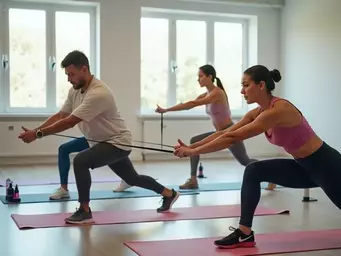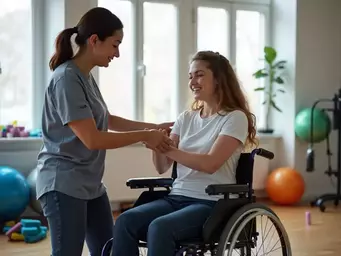Exercise Physiologists in NDIS Explained

Did you know that engaging in tailored exercise programs can significantly improve not just physical health, but also mental well-being? The role of Exercise Physiologists within the NDIS framework is more crucial than ever. This article explores their impact and the benefits they provide to individuals with disabilities.
Key Takeaways
- Personalized Programs: Exercise Physiologists create customized exercise plans that cater to each individual's unique strengths, limitations, and goals.
- Holistic Health Benefits: The benefits of engaging with Exercise Physiologists extend beyond physical fitness, positively impacting mental health and overall quality of life.
- Collaborative Approach: EPs work closely with other health professionals to ensure comprehensive support and rehabilitation for clients.
- Effective NDIS Navigation: They assist clients in understanding eligibility criteria and managing their NDIS funding effectively, ensuring access to necessary services.
- Empowerment Through Education: EPs educate clients about their bodies and health, fostering independence and motivation for a healthier lifestyle.
- Technology Integration: Utilizing apps and telehealth options enhances client engagement and makes support more accessible, especially in remote settings.
- Long-Term Health Management: Tailored exercise programs can aid in managing chronic diseases, leading to improved health outcomes and quality of life.
Key Contributions of Exercise Physiologists in Disability Support
Exercise Physiologists play a crucial role in enhancing the lives of individuals with disabilities through tailored exercise programs and collaborative approaches. Below is a visual representation of their key contributions.
Tailored Programs
Programs customized to meet individual needs, focusing on strengths and challenges.
Holistic Benefits
Improved physical and mental health outcomes and overall quality of life.
Collaboration
Working alongside other health professionals to ensure comprehensive support.
NDIS Alignment
Helping participants navigate NDIS funding and support structures.
Understanding the Integral Role of Exercise Physiologists in NDIS
When navigating the NDIS landscape, understanding the role of Exercise Physiologists (EPs) is vital. They are not just fitness trainers; they are highly qualified professionals dedicated to helping individuals with disabilities improve their physical health and overall well-being. At Health Moves, we believe that the impact of an EP can be transformative, especially when tailored to each individual's unique needs.
As an Exercise Physiologist, I often get asked what sets us apart. The answer lies in our specialized training and focus on rehabilitation through movement. We analyze clients' physical abilities and limitations, creating personalized exercise programs that enhance their functional capacity. This kind of support is crucial for anyone navigating the intricate NDIS framework.
Defining Exercise Physiologists: Qualifications and Expertise
To start, let's discuss what makes an Accredited Exercise Physiologist. EPs undergo extensive education, often holding a degree in exercise science or a related field, and they are recognized by professional bodies like Exercise & Sports Science Australia (ESSA). This rigorous training equips us with the knowledge to develop safe and effective exercise programs tailored to our clients' needs.
A key aspect of our qualifications is understanding the physical and mental challenges our clients may face. This specialized knowledge allows us to devise strategies that not only focus on exercise but also consider factors like motivation and personal goals. It’s about more than just movement; it’s about fostering independence and encouraging a healthier lifestyle.
What Makes an Accredited Exercise Physiologist?
As I mentioned, the qualifications of an EP are essential. Here’s a quick breakdown of what makes an accredited professional:
- Degree in exercise science or a related discipline
- Membership with a recognized professional body, such as ESSA
- Ongoing education and training to stay updated with the latest practices
This combination of education and experience ensures that Exercise Physiologists can provide the best support possible to those with disabilities.
The Importance of Specialized Knowledge in Disability Support
Living with a disability brings unique challenges that require thoughtful solutions. That's why having specialized knowledge is crucial. With the right training, Exercise Physiologists can:
- Understand diverse conditions like cerebral palsy, multiple sclerosis, or acquired brain injury
- Design exercise programs that cater specifically to individual needs
- Empower clients through education about their bodies and health
At Health Moves, we strive to be that bridge between the complexities of the NDIS and the practical support our clients need. By focusing on personalized strategies, we help individuals unlock their potential through tailored movement programs.
The Role of Exercise Physiologists within NDIS Framework
Exercise Physiologists play an integral role within the NDIS structure by providing essential services that enhance physical health and independence for individuals with disabilities. Our contributions are multi-faceted, ensuring each client receives the support they need for their unique journey.
We focus on crafting personalized exercise programs, collaborating with other health professionals, and above all, promoting an active lifestyle as a means of achieving better health outcomes. By combining our expertise with the NDIS framework, we create comprehensive support systems that facilitate success.
How Exercise Physiologists Contribute to Disability Support
At Health Moves, we have seen how Exercise Physiologists can truly transform lives. Here are a few key contributions we make:
- Designing individualized exercise regimens that address specific disabilities
- Monitoring progress and adapting programs as needed
- Providing education on the benefits of exercise for mental and physical health
These contributions are vital for fostering independence and improving the quality of life for individuals navigating the NDIS.
Personalized Exercise Programs: Tailoring to Individual Needs
The essence of our work lies in creating personalized exercise programs. We take into account each client's unique background, abilities, and aspirations. This tailored approach helps in:
- Setting achievable goals that inspire motivation
- Building upon existing strengths while addressing limitations
- Enhancing overall fitness levels in a safe and effective manner
By personalizing these programs, we help clients not only improve physically but also gain confidence in their abilities.
Collaboration with Allied Health Professionals in Rehabilitation
Collaboration is key in the world of disability support. At Health Moves, we actively work with other allied health professionals, like physiotherapists and occupational therapists, to provide holistic care. This teamwork allows us to:
- Share insights and strategies that enhance client outcomes
- Ensure comprehensive rehabilitation plans are in place
- Support clients as they transition through various stages of their recovery
Through this collaboration, we create a supportive network that prioritizes the well-being of our clients, making their NDIS experience smoother and more effective.
NDIS Funding: Accessing Support for Exercise Physiology Services
Understanding NDIS funding can be a bit overwhelming, but it’s essential for accessing the vital services offered by Exercise Physiologists. Knowing the eligibility criteria and how to navigate budget allocations can make a significant difference in receiving support.
At Health Moves, we aim to empower individuals and families with knowledge about accessing these funds, ensuring they can effectively utilize the NDIS framework.
Eligibility Criteria for NDIS Funding
To qualify for NDIS funding for exercise physiology services, participants generally need to meet certain criteria. Here’s what you should know:
- Be an Australian citizen or permanent resident
- Have a permanent and significant disability
- Be aged between 7 and 65 years at the time of application
Understanding these criteria is the first step towards accessing the support you need.
Navigating Budget Allocation within NDIS Plans
Once you’re eligible, the next hurdle is navigating the budget allocation within your NDIS plan. Here are some tips to keep in mind:
- Review your plan to see if it includes funding for exercise physiology services
- Communicate with your NDIS planner about your specific needs
- Keep records of your exercise sessions and progress to support future funding requests
By taking an active role in understanding and managing your NDIS budget, you can maximize your access to important services.
Benefits of Engaging Exercise Physiologists for Individuals with Disabilities
Engaging with an Exercise Physiologist has numerous benefits for individuals with disabilities. From enhancing physical health to improving overall quality of life, our services play a crucial role in promoting well-being.
At Health Moves, we’ve witnessed firsthand how tailored movement programs can drastically change lives, and we are passionate about sharing these benefits with our community.
Enhancing Physical Health and Independence
Regular engagement in exercise programs designed by EPs can have a profound effect on physical health. Here are some key enhancements:
- Improved muscular strength and endurance
- Better cardiovascular fitness
- Increased flexibility and balance
As clients improve their physical health, they often find a newfound sense of independence, which is incredibly rewarding.
Improving Quality of Life through Tailored Exercise
It's not just about physical health—exercise can significantly enhance overall quality of life. Here’s how:
- Boosting mental health and reducing anxiety levels
- Creating opportunities for social engagement through group classes
- Encouraging a sense of accomplishment and empowerment
These improvements contribute to a more fulfilling life, which aligns perfectly with our mission at Health Moves.
Chronic Disease Management through Exercise Physiologist Support
For those managing chronic diseases, the role of Exercise Physiologists is vital. We provide support by:
- Developing exercise plans that cater specifically to chronic conditions
- Educating clients about managing symptoms through movement
- Monitoring progress and adapting plans as needed
This proactive approach not only helps manage chronic diseases but also promotes a healthier lifestyle overall.
Real-Life Impact: Personal Stories from NDIS Participants
What truly brings the role of Exercise Physiologists to life are the real stories from NDIS participants. These personal experiences highlight the positive outcomes of our services and remind us why we do this work.
At Health Moves, we are proud to share these stories, as they reflect the journeys of individuals who have transformed their lives through exercise.
Testimonials Highlighting the Positive Outcomes of Exercise Physiology
Hearing from our clients is one of the most rewarding parts of my job. Testimonials often reveal:
- Increased confidence in physical abilities
- Improved relationships with family and friends
- A greater understanding of personal health and wellness
These stories remind us that our efforts truly make a difference.
Case Studies: Transformative Experiences with Exercise Programs
We often compile case studies that showcase the journey of our clients. These cases illustrate:
- The specific challenges faced before engaging with an EP
- The tailored exercise programs developed for them
- The positive changes observed over time
At Health Moves, we take great pride in sharing these transformative experiences to inspire others seeking support.
Best Practices for Maximizing NDIS Exercise Physiology Services
To make the most of your exercise physiology services through NDIS, it’s vital to engage effectively with your Exercise Physiologist. Here are some best practices that I recommend:
By following these strategies, clients can cultivate a productive partnership that fosters growth and success in their fitness journey.
Guidelines for Participants to Engage Effectively with Exercise Physiologists
Active participation is key. Here are some guidelines to help:
- Be open and honest about your goals and limitations
- Ask questions and seek clarification on your exercise plans
- Stay consistent with your sessions to achieve better outcomes
These practices can create a supportive environment where progress is made more effectively.
Incorporating Technology: Apps and Wearables in Exercise Programs
We live in a digital age, and technology can enhance your exercise experience. Consider:
- Using fitness apps to track your progress
- Wearable devices to monitor heart rate and activity levels
- Online resources and videos for additional exercise guidance
Incorporating technology can add a fun aspect to your workouts and keeps you motivated!
Utilizing Telehealth for Remote Support and Client Engagement
Telehealth services have become increasingly popular, especially for individuals who prefer remote support. This approach enables:
- Convenient access to your EP from home
- Flexibility in scheduling sessions
- Continued support even when physical meetings aren't possible
At Health Moves, we are committed to offering various avenues for connection, ensuring that everyone can access our services regardless of their situation.
Frequently Asked Questions About Exercise Physiologists in NDIS
As an Exercise Physiologist, I often receive questions from clients about what to expect and how to choose the right professional. Here are some common queries and insights based on my experiences.
By addressing these frequently asked questions, we can alleviate concerns and guide clients towards making informed decisions.
What Should I Expect from an Exercise Physiology Session?
It's natural to wonder what a session with an Exercise Physiologist looks like. Generally, you can expect:
- A comprehensive assessment of your physical abilities
- Developing a personalized exercise program tailored to your goals
- Ongoing support and adjustments as needed
Rest assured, each session is designed to empower you and foster a positive experience.
How to Choose the Right Exercise Physiologist for NDIS Needs
Selecting the right Exercise Physiologist is crucial. Here are some tips to consider:
- Look for accreditation and relevant qualifications
- Consider their experience with your specific disability
- Seek recommendations from others within the NDIS community
Taking the time to choose wisely can lead to a more fruitful partnership.
Understanding Evidence-Based Practice in Exercise Programs
Lastly, it's essential to recognize the importance of evidence-based practice in exercise programs. This means:
- Utilizing scientific research to inform exercise strategies
- Continually assessing the effectiveness of programs
- Adapting practices based on the latest findings in health and exercise science
At Health Moves, we incorporate these principles into our work, ensuring that our clients receive the best care possible.
FAQs about Exercise Physiology and NDIS
- What is the primary role of an Exercise Physiologist in the NDIS?
- Exercise Physiologists (EPs) create and deliver tailored exercise programs to individuals with disabilities, focusing on improving their physical health, functional capacity, and overall well-being within the NDIS framework.
- What qualifications do Accredited Exercise Physiologists hold?
- Accredited EPs typically hold a university degree in exercise science or a related field and are recognized by professional bodies like Exercise & Sports Science Australia (ESSA), ensuring specialized training and ongoing professional development.
- How does NDIS funding work for Exercise Physiology services?
- To access NDIS funding, participants must meet specific eligibility criteria (e.g., Australian citizen/resident, permanent significant disability, aged 7-65). Funding for EP services is then allocated within the participant's NDIS plan, which they can navigate with guidance from their EP or NDIS planner.
- What are the key benefits of engaging an Exercise Physiologist for individuals with disabilities?
- Benefits include enhanced physical health (strength, endurance, balance), improved independence, better management of chronic conditions, boosted mental health (reduced anxiety, improved mood), and an overall improved quality of life.
- Do Exercise Physiologists work with other health professionals?
- Yes, EPs often collaborate with other allied health professionals, such as physiotherapists and occupational therapists, to provide comprehensive, holistic care and ensure rehabilitation plans are integrated and effective.
- Can technology be used in NDIS Exercise Physiology programs?
- Absolutely. Technology like fitness apps, wearable devices, and telehealth services can enhance client engagement, track progress, provide remote support, and make exercise programs more accessible and motivating, especially for those in remote areas.
Interactive Poll: Your Experience with Exercise Physiologists
We want to hear from you! Have you worked with an Exercise Physiologist as part of your NDIS journey? Share your experiences and insights:
Summarizing the Role of Exercise Physiologists in Enhancing NDIS Outcomes
As we explore the landscape of the NDIS, it becomes increasingly clear just how vital Exercise Physiologists are in enhancing outcomes for individuals with disabilities. At Health Moves, we passionately believe that tailored movement programs not only support physical health but also uplift spirits and foster independence. By understanding the role and benefits of exercise physiology, we can appreciate the profound impact it has on the NDIS community.
When we think about the NDIS, we often focus on the resources available. However, it’s essential to recognize how Exercise Physiologists serve as guides in navigating these resources effectively. By weaving personalized exercise programs into the fabric of NDIS support, they empower individuals to reach their goals, enhancing both physical and mental well-being.
Key Takeaways on the Importance of Exercise Physiology
Reflecting on the contributions of Exercise Physiologists, we can summarize several key takeaways that highlight their importance:
- Tailored Programs: Each program is customized to meet the unique needs of individuals, focusing on their strengths and challenges.
- Holistic Benefits: Beyond physical health, these programs can lead to improved mental health outcomes and overall quality of life.
- Collaboration: Exercise Physiologists work alongside other health professionals, ensuring comprehensive support for the individual.
- NDIS Alignment: They help participants navigate the complexities of NDIS funding and support, enhancing accessibility.
For individuals with disabilities, these elements come together to create a supportive environment that encourages growth and achievement. At Health Moves, we strive to highlight these benefits, ensuring families understand the value of engaging with an accredited Exercise Physiologist.
Recap of the Role and Benefits for Individuals with Disabilities
To recap, the role of Exercise Physiologists within the NDIS framework is multifaceted. They not only design programs that cater to individual needs but also promote independence and a higher quality of life. Imagine participating in an exercise program that not only boosts your physical health but also enhances your confidence and social skills—this is the transformative power of tailored exercise.
Engagement with Exercise Physiologists leads to numerous benefits, including:
- Increased mobility and strength
- Better management of chronic conditions
- Enhanced mental health through physical activity
- Improved social connections through group activities
Understanding NDIS Funding and Accessibility of Services
Understanding the funding structure of the NDIS can be daunting. However, with the right support from Exercise Physiologists, navigating this system becomes much more manageable. They can assist in identifying eligibility criteria and ensuring that individuals access the services they need for their tailored movement programs.
Additionally, it’s crucial to engage in open conversations about budget allocation within NDIS plans. Exercise Physiologists can help clarify how funding can be effectively utilized for exercise services, maximizing the potential for positive outcomes. Remember, every step towards understanding this process is a step towards empowerment!
The Impact of Exercise on Mental Health and Wellness Programs
Exercise is not just about physical fitness; it plays a pivotal role in mental health as well! Regular physical activity can alleviate symptoms of anxiety and depression, leading to a happier, more fulfilled life. Participants often report feeling more energized and positive after engaging in tailored exercise.
At Health Moves, we understand that mental wellness is just as important as physical health. Here are some ways exercise positively impacts mental health:
- Boosts mood-enhancing endorphins
- Reduces feelings of stress and anxiety
- Enhances cognitive function and memory
- Promotes better sleep patterns
By incorporating these elements into exercise programs, we can help NDIS participants not only improve their physical well-being but also foster a positive mindset.
Encouraging Action: Connecting with Accredited Exercise Physiologists
It's time to take action and connect with an accredited Exercise Physiologist for your NDIS needs! Here are some steps to help you get started:
- Determine your eligibility for NDIS funding.
- Research and reach out to Exercise Physiologists who specialize in disability support.
- Discuss your specific goals and needs during the initial consultation.
- Collaborate with your Exercise Physiologist to create a personalized movement program.
Taking these steps can significantly enhance your journey through the NDIS. At Health Moves, we are here to support you every step of the way, ensuring that you find the right fit for your unique needs.
Resources for Further Learning and Support in Exercise Physiology
To expand your knowledge about exercise physiology and its benefits, consider exploring the following resources:
- NDIS official website for funding information
- Local exercise physiology associations for accredited practitioners
- Online forums and community groups for shared experiences
- Books and articles on disability support and exercise science
These resources can provide invaluable insights and help you feel more confident in navigating your NDIS journey. Remember, you’re not alone—there's a supportive community ready to share knowledge and experiences!
Engaging in Lifestyle Modifications for Better Health Outcomes
Lastly, engaging in lifestyle modifications can lead to better health outcomes. Small changes in daily routines, guided by your Exercise Physiologist, can make a significant difference over time. Here are some simple modifications to consider:
- Incorporate more physical activity into your day.
- Focus on a balanced diet that supports your exercise goals.
- Prioritize sleep and stress management techniques.
- Stay socially connected through group activities or classes.
By adopting these lifestyle changes, NDIS participants can enhance their overall well-being and create a pathway to success. At Health Moves, we’re committed to empowering you to achieve your goals through tailored support and expert guidance.
Recap of Key Points
Here is a quick recap of the important points discussed in the article:
- Essential Role of Exercise Physiologists: EPs provide tailored exercise programs that enhance physical health and support individuals with disabilities within the NDIS framework.
- Qualifications and Specialization: Accredited Exercise Physiologists possess degrees in exercise science and ongoing training, ensuring they are equipped to address unique client needs.
- Collaboration is Key: EPs work alongside other health professionals to create comprehensive support systems for clients, promoting holistic rehabilitation.
- Importance of Personalization: Tailored exercise programs are designed based on individual strengths, limitations, and personal goals, fostering independence and improved quality of life.
- Navigating NDIS Funding: Understanding eligibility criteria and budget allocations is crucial for accessing exercise physiology services effectively within the NDIS.
- Impact on Mental Health: Regular exercise significantly improves not only physical health but also mental well-being, reducing symptoms of anxiety and depression.








